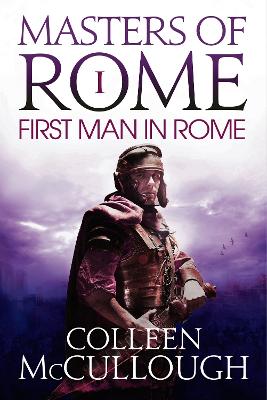Reviewed by brokentune on
I've always been hesitant about reading The First Man in Rome, Colleen McCullough's magnum opus about the Roman Republic. I just didn't know what to expect, and the size of the book (my very large hardcopy version had 700+ pages) was a little off-putting, too. However, I loved her writing in The Thornbirds and I knew that McCullough was a history buff, so I had to check the book out when I saw it in the library.
I'm glad I've read it. It was difficult to get used to the names and find out who is who at first, but ultimately the stories of the main characters develop and interlope and become quite interesting. McCullough goes into a lot detail in describing life and customs in ancient Rome - some I was familiar with and A LOT that I learned. Her attention to detail is fantastic. And, yet, she does not beat the reader over the head with explanations of the political systems, the structure of the military, or Roman history. McCullough requires some pre-existing knowledge from her readers and it makes the book very engaging - it's like a dialogue between reader and author.
In short, The First Man in Rome is a brilliant example of what historical fiction can be.
And, yet, why can I not give the book 5 stars?
Well, some of the story is drawn out way beyond what I was able to pay attention to. Yes, some parts dragged. There, I said it. What drove me nuts more than this, tho, was that there were no chapters! It was difficult at times, especially after putting the book down, where the story was at and which person the particular part was focusing on. Seriously, this structural/editing choice really got to me.
Lastly, though, as much as I admire McCullough's work here, some of the ways that the Roman paranoia of an impending invasion was portrayed almost without comment made me wonder whether McCullough, despite her love of detail, stuck to the classic Roman-is-best narrative for dramatic reasons or whether she truly subscribed to that particular historical perspective. In Thornbirds, part of the admiration I have for McCullough's work is that she challenged some of the characters attitudes - or indeed created one of the finest characters in the book to antagonize an entire religion! - whereas this is missing from The First Man in Rome. I really missed the gumption of a character of Mary Carson's quality and not even Sulla could make up for this.
Marius glared. "The worst of you - Sulla! - is that I will never know what makes you work! What makes your legs go up and down, what makes your arms swing, why you smile like a wolf. And what you really think. That I'll never, never know."
"If it's any consolation, brother-in-law, nor will anyone else. Even me," said Sulla.
Reading updates
- Started reading
- 29 October, 2016: Finished reading
- 29 October, 2016: Reviewed
